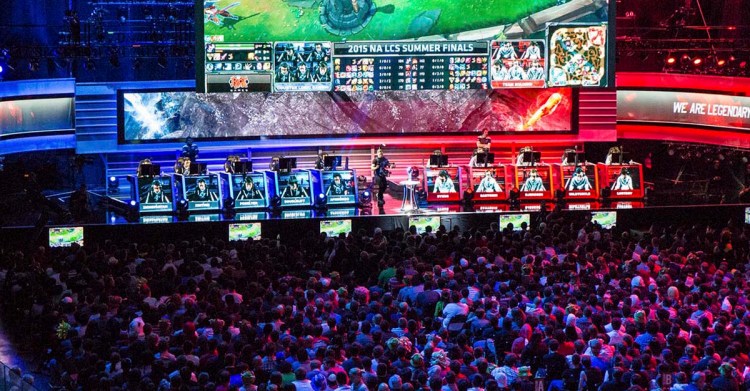Radio host Colin Cowherd doesn’t like it, but corporations that specialize in traditional sports are taking more and more interest in competitive gaming. And now that includes Disney’s flagship cable sports network.
ESPN is the latest company building a team to cover esports. The network has hired veteran writers Rod “Slasher” Breslau, formerly of TheScore Esports; and Tyler “Fionn” Erzberger, previously of LOLEsports, to report on the scene. Azubu’s (a Twitch video competitor for esports) managing editor Darin Kwilinski will lead the division. This new team will waste no time getting into coverage — it’s covering the League of Legends Championship Series this weekend, which is by far the most-watched (and most-played) esports game on the planet.
Esports is the widely used term for the idea of playing games professionally. Generally, this means participating in tournaments and leagues for money. It is a big deal due to its growth over the last few years as well as its popularity with young people. In a statement provided to GamesBeat, ESPN confirmed that it sees how loved esports is, and it wants a piece of that.
“Today’s launch — anchored by the influential voices of Darin Kwilinski, Rod Breslau, and Tyler Erzberger — is our latest push to reach and connect with this growing and passionate audience,” ESPN.com and ESPN The Magazine editor-in-chief Chad Millman said. “Fans will find the same level of quality content and journalism that users of ESPN.com have come to expect, including in-depth looks at the competitive gaming world and on-site reporting from the major tournaments.”
This announcement comes just a few weeks after Call of Duty publisher Activision announced that it has acquired the assets of Major League Gaming. This was an esports league that held events for a variety of games. In the wake of that $46 million purchase, Activision chief executive Bobby Kotick said that he is hoping to make his company the “ESPN of esports.”
Now we have ESPN pulling something of a “not so fast.”
And ESPN’s reasoning for getting into esports makes sense when you look at the size and demographics of the market. The LCS (League Championship Series) had an average concurrent viewership of 4.2 million through its final event. That peaked at 14 million at one point. These are massive numbers that compare favorably to the playoffs for traditional sports like NCAA basketball, Major League Baseball, and the National Basketball Association.
“According to research undertaken by Newzoo, esports audiences currently rival those of the NHL, and should reach NFL levels by 2017,” VB Insight marketing technology director Stewart Rogers told GamesBeat. “That isn’t the whole story; the average esports viewer spends almost 10X less per year than the American Football-viewing equivalent, but with the likes of ESPN taking esports seriously, that is set to increase over time.”
But this isn’t just a quantity thing — it’s the age and behavior of the people in that audience. As you might imagine, esports is primarily young men. Nearly half are men between the ages of 21 and 35, which is key to marketers. A huge portion of the rest of the audience is younger than that.
These fans are consuming live and recorded esports video content for hours at a time. Viewers watched 360 million hours of the most recent LCS event at the end of 2015. That translates to several hours each day. In 2014, Twitch, one of the biggest livestreaming video sites, confirmed that its audience watches an average of 1 hour and 45 minutes of broadcasts per person per day.
Getting that kind of engagement from that many young men is incredibly difficult, and it’s something that traditional media companies highly covet. Traditional sports are losing interest, and it doesn’t look like that’s going to turn around. Fewer high school-aged kids are participating in sports. Starting in 2008 and continuing through 2012, football saw a 5.4 percent drop in players from 3.26 million to 3.08 million. And they aren’t going to soccer, baseball, or basketball — those sports saw declines of 7.1 percent, 7.2 percent, and 8.3 percent, respectively. Only lacrosse is growing, but it isn’t making up the difference for what the other sports are losing.
Instead, more kids are turning to esports. That is why so many people believe that pro gaming is the future. The next generation is embracing it more and more every day.
Of course, some people don’t like the idea of physical sports sharing the same channel or site as esports.
Guys like Cowherd and even ESPN president John Skipper have criticized and mocked the idea of pro gaming.
“It’s not a sport — it’s a competition,” Skipper said in 2014. “Chess is a competition. Checkers is a competition. Mostly, I’m interested in doing real sports.”
Since that time, we’ve seen more athletes and people from that world warming up to idea of esports. Former NBA forward Rick Fox came out and said he thinks competitive gaming is a sport, and he also purchased a League of Legends team for $1 million called Echo Fox. Dallas Mavericks owner Mark Cuban invested in daily esports fantasy site Unikrn, and he even called Cowherd an idiot.
At this point, esports has arrived. And while guys like Cuban and Cowherd squabble over whether or not people who take it seriously, the next generation of fans is already convinced. And that almost makes ESPN (and Activision) late for a party where they will probably look like they don’t belong.
But they see too many dollar signs to not even try.
VentureBeat's mission is to be a digital town square for technical decision-makers to gain knowledge about transformative enterprise technology and transact. Learn More

